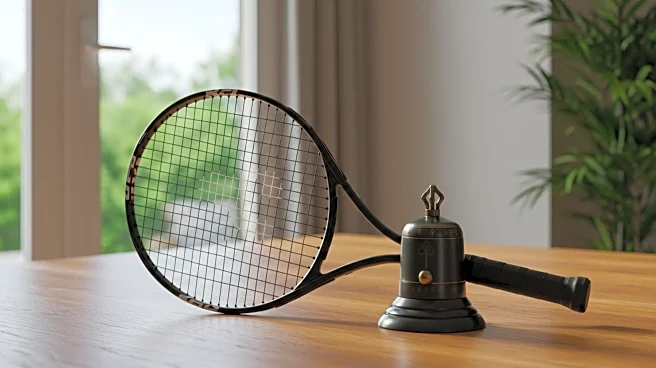What's Happening?
Jessica Pegula, a prominent tennis player, has shared insights into her mental strategies and personal routines that contribute to her success on the court. At 31, Pegula emphasizes the mental aspect of her game, which she estimates to be 90 percent of her performance, especially during high-pressure tournaments like Wimbledon and the U.S. Open. She discusses the importance of managing emotions and learning from experiences in front of large audiences. Pegula finds therapeutic relief in caring for her dogs and engages in activities like golfing, cooking, and working on her skincare brand to shift focus away from tennis. Her pre-match routine is adaptable, involving tasks like restringing racquets and preparing hydration, which she adjusts based on her environment. Meditation plays a crucial role in managing her emotions, allowing her to acknowledge and release anxious thoughts. Pegula also highlights the importance of taking breaks when necessary and maintaining a present-focused mindset during matches.
Why It's Important?
Pegula's approach underscores the significance of mental health and adaptability in professional sports. Her strategies offer valuable lessons for athletes and individuals facing high-pressure situations, emphasizing the need for emotional management and self-care. By sharing her experiences, Pegula contributes to the broader conversation about mental health in sports, encouraging others to prioritize their well-being alongside their professional goals. Her insights also highlight the importance of flexibility in routines and the ability to adapt to changing circumstances, which can be applied beyond sports to various aspects of life. This focus on mental resilience and personal well-being is increasingly relevant in today's fast-paced and demanding world.
What's Next?
As Pegula continues her tennis career, her mental strategies and personal routines are likely to evolve, potentially influencing other athletes and sports professionals. Her emphasis on mental health may inspire further discussions and initiatives within the sports community to support athletes' psychological well-being. Additionally, Pegula's involvement in activities outside of tennis, such as her skincare brand and nonprofit work with service dogs, may expand, offering her new avenues for personal growth and impact. The sports industry may also see increased attention to mental health resources and support systems for athletes, driven by the experiences and advocacy of players like Pegula.
Beyond the Headlines
Pegula's story highlights the broader cultural shift towards recognizing the importance of mental health in sports and society. Her openness about emotional challenges and coping mechanisms reflects a growing acceptance of discussing mental health issues publicly. This shift may lead to more comprehensive support systems for athletes and individuals in high-stress environments, promoting a healthier balance between professional demands and personal well-being. Pegula's approach also raises ethical considerations about the pressures faced by athletes and the responsibility of sports organizations to provide adequate mental health resources.












